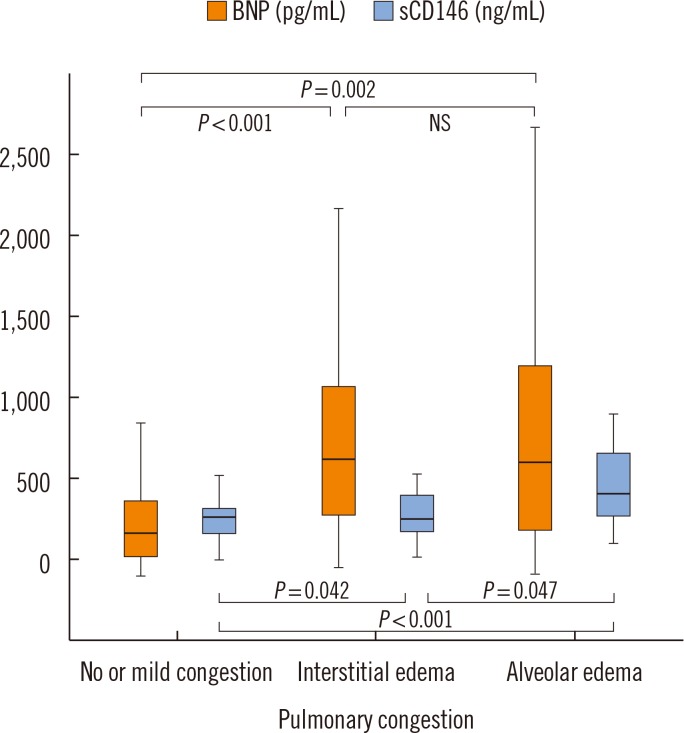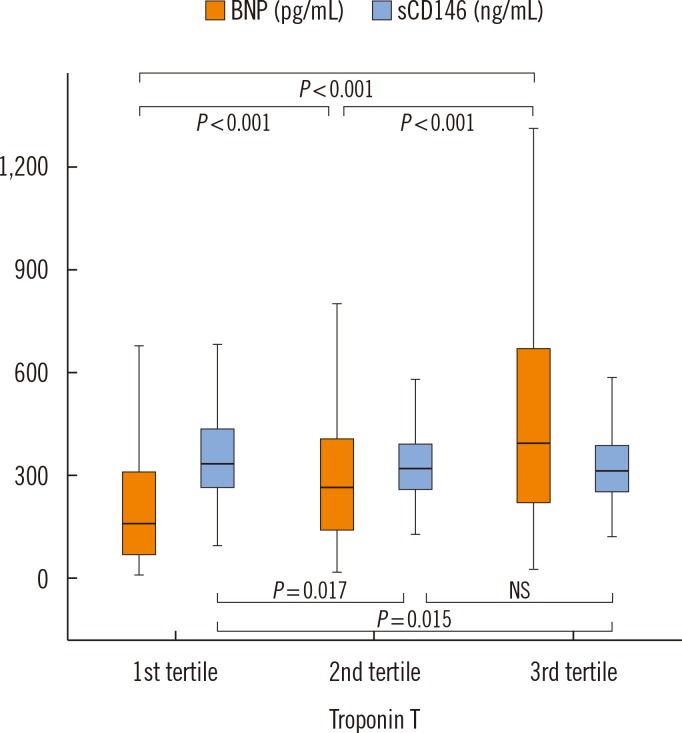Ann Lab Med.
2016 Jul;36(4):300-305. 10.3343/alm.2016.36.4.300.
Plasma Levels of Soluble CD146 Reflect the Severity of Pulmonary Congestion Better Than Brain Natriuretic Peptide in Acute Coronary Syndrome
- Affiliations
-
- 1Department of Internal Medicine and Cardiology, University Hospital Brno, Brno, Czech Republic.
- 2Faculty of Medicine, Masaryk University, Brno, Czech Republic.
- 3INSERM UMR-S 942, Paris, France. alexandre.mebazaa@aphp.fr
- 4Department of Anesthesiology and Critical Care Medicine, AP-HP, Saint Louis Lariboisière University Hospitals, Paris, France.
- 5Department of Cardiology, University Heart Center, University Hospital Zurich, Zurich, Switzerland.
- 6International Clinical Research Center-Department of Cardiovascular Disease, University Hospital St Anne's, Brno, Czech Republic.
- 7Université Paris Diderot, PRES Sorbonne Paris Cité, France.
- 8Institute of Biostatistics and Analyses, Faculty of Medicine, Masaryk University, Brno, Czech Republic.
- KMID: 2373548
- DOI: http://doi.org/10.3343/alm.2016.36.4.300
Abstract
- BACKGROUND
Acute heart failure negatively affects short-term outcomes of patients with acute coronary syndrome (ACS). Therefore, reliable and non-invasive assessment of pulmonary congestion is needed to select patients requiring more intensive monitoring and therapy. Since plasma levels of natriuretic peptides are influenced by myocardial ischemia, they might not reliably reflect congestion in the context of ACS. The novel endothelial biomarker, soluble CD146 (sCD146), presents discriminative power for detecting the cardiac origin of acute dyspnea similar to that of natriuretic peptides and is associated with systemic congestion. We evaluated the performance of sCD146 for the assessment of pulmonary congestion in the early phase of ACS.
METHODS
One thousand twenty-one consecutive patients with ACS were prospectively enrolled. Plasma levels of sCD146, brain natriuretic peptide (BNP), and high-sensitive troponin T were measured within 24 hr after the onset of chest pain. Pulmonary congestion on chest radiography was determined and classified in three groups according to the degree of congestion.
RESULTS
Nine hundred twenty-seven patients with ACS were analyzed. Ninety-two (10%) patients showed signs of pulmonary edema on chest radiography. Plasma levels of sCD146 reflected the radiological severity of pulmonary congestion. Higher plasma levels of sCD146 were associated with the worse degree of pulmonary congestion. In contrast to BNP, sCD146 levels were not affected by the level of troponin T.
CONCLUSIONS
The novel endothelial biomarker, sCD146, correlates with radiological severity of pulmonary congestion in the early phase of ACS and, in contrast to BNP, is not affected by the amount of myocardial cell necrosis.
Keyword
MeSH Terms
-
Acute Coronary Syndrome/*diagnosis/diagnostic imaging
Aged
Antigens, CD146/blood
Biomarkers/blood
Chest Pain/diagnostic imaging/*pathology
Electrocardiography
Enzyme-Linked Immunosorbent Assay
Female
Humans
Male
Middle Aged
Myocardial Infarction/diagnosis
Natriuretic Peptide, Brain/*blood
Severity of Illness Index
Troponin T/blood
Antigens, CD146
Biomarkers
Natriuretic Peptide, Brain
Troponin T
Figure
Reference
-
1. Fonarow GC, Abraham WT, Albert NM, Stough WG, Gheorghiade M, Greenberg BH, OPTIMIZE-HF Investigators and Hospitals, et al. Factors identified as precipitating hospital admissions for heart failure and clinical outcomes: findings from OPTIMIZE-HF. Arch Intern Med. 2008; 168:847–854. PMID: 18443260.2. Bahit MC, Lopes RD, Clare RM, Newby LK, Pieper KS, Van de Werf F, et al. Heart failure complicating non-ST-segment elevation acute coronary syndrome: timing, predictors, and clinical outcomes. JACC Heart Fail. 2013; 1:223–229. PMID: 24621874.3. Heeschen C, Hamm CW, Mitrovic V, Lantelme NH, White HD. Platelet Receptor Inhibition in Ischemic Syndrome Management (PRISM) Investigators. N-terminal pro-B-type natriuretic peptide levels for dynamic risk stratification of patients with acute coronary syndromes. Circulation. 2004; 110:3206–3212. PMID: 15533869.
Article4. Sabatine MS, Morrow DA, de Lemos JA, Omland T, Desai MY, Tanasijevic M, et al. Acute changes in circulating natriuretic peptide levels in relation to myocardial ischemia. J Am Coll Cardiol. 2004; 44:1988–1995. PMID: 15542281.
Article5. Gayat E, Caillard A, Laribi S, Mueller C, Sadoune M, Seronde MF, et al. Soluble CD146, a new endothelial biomarker of acutely decompensated heart failure. Int J Cardiol. 2015; 199:241–247. PMID: 26209827.
Article6. Thygesen K, Alpert JS, Jaffe AS, Simoons ML, Chaitman BR, White HD, et al. Third universal definition of myocardial infarction. Eur Heart J. 2012; 33:2551–2567. PMID: 22922414.
Article7. Bardin N, Moal V, Anfosso F, Daniel L, Brunet P, Sampol J, et al. Soluble CD146, a novel endothelial marker, is increased in physiopathological settings linked to endothelial junctional alteration. Thromb Haemost. 2003; 90:915–920. PMID: 14597988.
Article8. Picano E, Gargani L, Gheorghiade M. Why, when, and how to assess pulmonary congestion in heart failure: pathophysiological, clinical, and methodological implications. Heart Fail Rev. 2010; 15:63–72. PMID: 19504345.
Article9. Mebazaa A, Yilmaz MB, Levy P, Ponikowski P, Peacock WF, Laribi S, et al. Recommendations on pre-hospital & early hospital management of acute heart failure: a consensus paper from the Heart Failure Association of the European Society of Cardiology, the European Society of Emergency Medicine and the Society of Academic Emergency Medicine. Eur J Heart Fail. 2015; 17:544–558. PMID: 25999021.
- Full Text Links
- Actions
-
Cited
- CITED
-
- Close
- Share
- Similar articles
-
- The Plasma Level of N-terminal Pro B-type Natriuretic Peptide(NT-proBNP) for Severity of Coronary Artery Stenosis and Early Risk Stratification in Patients with Non ST Elevation Acute Coronary Syndrome
- Plasma Atrial Natriuertic Peptide (ANP) Levels and Hemodynamic Data in Patient with Heart Disease
- High Plasma Levels of the B-type Natriuretic Peptide in Patients Without Heart Failure: Is There Clinical Significance?
- Availability of Bedside N-terminal Pro-Brain Natriuretic Peptide Measurement as Prognostic Marker About Development of Major Adverse Cardiovascular Events in Patients of Acute Coronary Syndromes
- Plasma Brain Natriuretic Peptide Concentration and Tissue Doppler Imaging for Acute Febrile Phase in Patients with Kawasaki Disease



